初中英语语法知识—情态动词的知识点训练含答案
初中英语语法之情态动词用法及练习题(含答案)
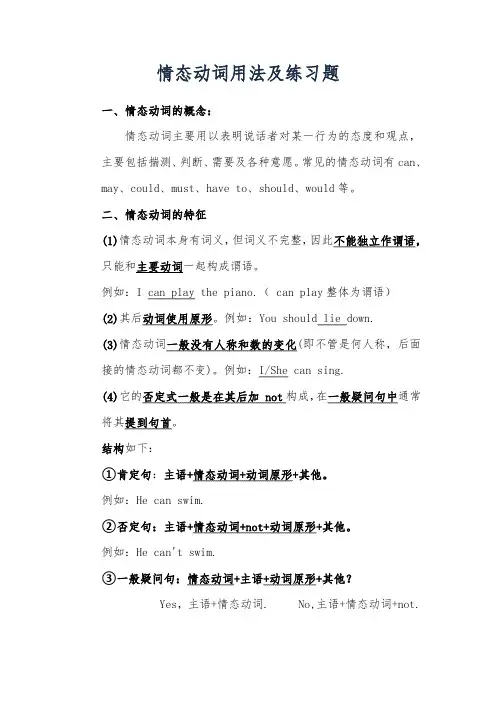
情态动词用法及练习题一、情态动词的概念:情态动词主要用以表明说话者对某一行为的态度和观点,主要包括揣测、判断、需要及各种意愿。
常见的情态动词有can、may、could、must、have to、should、would等。
二、情态动词的特征(1)情态动词本身有词义,但词义不完整,因此不能独立作谓语,只能和主要动词一起构成谓语。
例如:I can play the piano.( can play整体为谓语)(2)其后动词使用原形。
例如:You should lie down.(3)情态动词一般没有人称和数的变化(即不管是何人称,后面接的情态动词都不变)。
例如:I/She can sing.(4)它的否定式一般是在其后加 not构成,在一般疑问句中通常将其提到句首。
结构如下:①肯定句:主语+情态动词+动词原形+其他。
例如:He can swim.②否定句:主语+情态动词+not+动词原形+其他。
例如:He can't swim.③一般疑问句:情态动词+主语+动词原形+其他?Yes,主语+情态动词. No,主语+情态动词+not.例如:-Can he swim?-Yes, he can. No,he can’t.④特殊疑问句:特殊疑问词+情态动词+主语+动词原形+其他? 例如: -What can he do ?-He can swim.三.情态动词的用法(1)can的用法①表示“能力”Can you sing?你会唱歌吗?②表示客观条件允许You can listen to music here.你可以在这里听音乐。
You can’t park your car here. 你不能在此停车③can用在否定句和疑问句中时,有时表示说话人的怀疑、惊异、或猜测:It can’t be true.这不可能是事实Can it be true?这可能是真的吗?④.can的搭配用法:A.as +adj./adv.+as one can/could “尽可能,尽量……”,如:The man took his child to the hospital as quickly as he could.这个男人尽可能快地将孩子送去医院。
最新初中英语语法知识—情态动词的知识点训练及答案
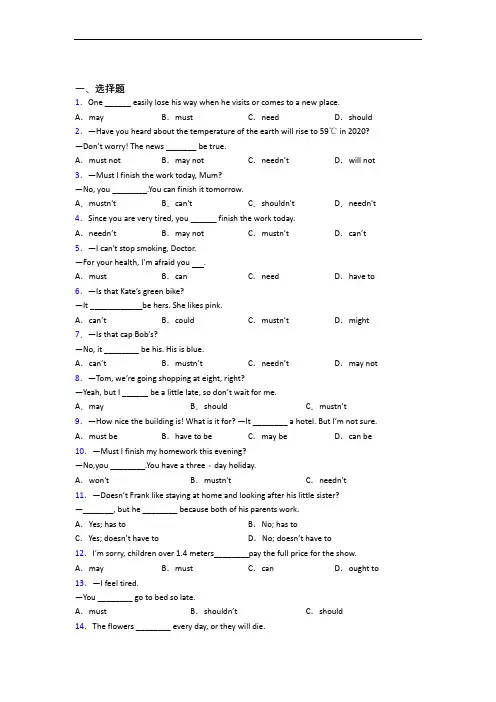
一、选择题1.One ______ easily lose his way when he visits or comes to a new place.A.may B.must C.need D.should 2.—Have you heard about the temperature of the earth will rise to 59℃ in 2020?—Don’t worry! The news _______ be true.A.must not B.may not C.need n’t D.will not 3.—Must I finish the work today, Mum?—No, you ________.You can finish it tomorrow.A.mustn't B.can't C.shouldn't D.needn't 4.Since you are very tired, you ______ finish the work today.A.needn’t B.may not C.mustn’t D.can’t 5.―I can't stop s moking, Doctor.―For your health, I'm afraid you .A.must B.can C.need D.have to 6.—Is that Kate’s green bike?—It ____________be hers. She likes pink.A.can’t B.could C.mustn’t D.might 7.—Is that cap Bob’s?—No, it ________ be his. His is blue.A.can’t B.mustn’t C.needn’t D.may not 8.—Tom, we’re going shopping at eight, right?—Yeah, but I ______ be a little late, so don’t wait for me.A.may B.should C.mustn’t 9.—How nice the building is! What is it for? —It ________ a hotel. But I’m not sure. A.must be B.have to be C.may be D.can be 10.—Must I finish my homework this evening?—No,you ________.You have a three﹣day holiday.A.won't B.mustn't C.needn't 11.—Doesn’t Frank like staying at home and looking after his little sister?—_______, but he ________ because both of his parents work.A.Yes; has to B.No; has toC.Yes; doesn’t have to D.No; doesn’t have to12.I’m sorry, children over 1.4 meters________pay the full price for the show. A.may B.must C.can D.ought to 13.—I feel tired.—You ________ go to bed so late.A.must B.shouldn’t C.should 14.The flowers ________ every day, or they will die.A.must water B.can be wateredC.should water D.must be watered15.-_________ you help me with my homework?-Of course if I __________.A.Could; could B.Can't; can C.Could; can D.Can; could 16.Will you please________them________the Birdwatching Society?A.inviting; join B.to invite; to join C.invite; to join D.to invite; join 17.—Mum, I’ve signed for a big box by Future Express (快递). What’s in it?—I’m not sure. I t ________be a present from your brother.A.need B.must C.may D.will 18.—Could you help me download some Taylor Swift’s songs from Ku Gou?—Sorry, people download music from the Internet without paying, because it’s against the law. A.wouldn’t B.needn’tC.mustn’t D.couldn’t19.一Already five people in the taxi, but the driver managed to take me as well.一Terrible, and it be an uncomfortable journey.A.can B.should C.must D.need20.---You look very pretty, if I say so.---Thanks a lot for saying that.A.must B.may C.will D.have to21.-Mum, must I stay there the whole day?-No, you__________. You__________ come back after lunch, if you like.A.mustn’t; can B.needn’t; must C.needn’t; may22.You __ drive your car so fast. It's very dangerous.A.wouldn't B.shouldn't C.couldn't D.mightn't【参考答案】***试卷处理标记,请不要删除一、选择题1.A解析:A【解析】【分析】【详解】句意:当一个人参观或来到一个新地方时可能很容易迷路。
完整版初中英语情态动词讲解练习及答案
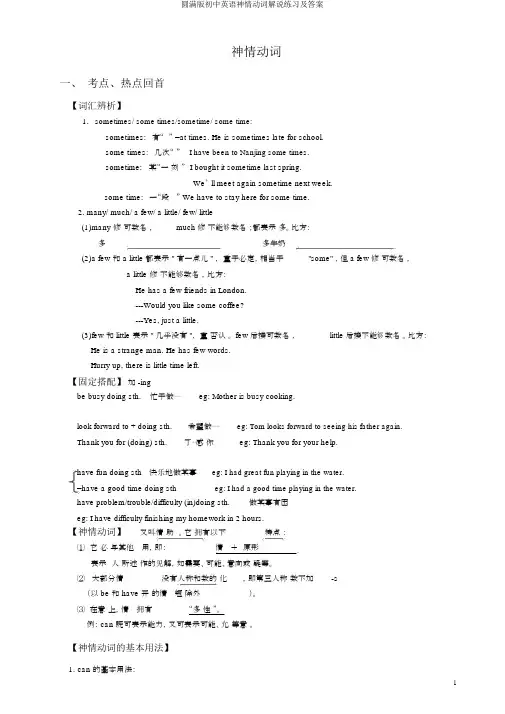
神情动词一、考点、热点回首【词汇辨析】1.sometimes/ some times/sometime/ some time:sometimes:有“ ” =at times. He is sometimes late for school.some times:几次“ ”I have been to Nanjing some times.sometime:某“一刻” I bought it sometime last spring.We’ ll meet again sometime next week.some time:一“段” We have to stay here for some time.2. many/ much/ a few/ a little/ few/ little(1)many 修可数名,much 修不能够数名;都表示多。
比方:多多牛奶(2)a few 和 a little 都表示 " 有一点儿 " ,重于必定,相当于"some" ,但 a few 修可数名,a little 修不能够数名,比方:He has a few friends in London.---Would you like some coffee?---Yes, just a little.(3)few 和 little 表示 " 几乎没有 ",重否认。
few 后接可数名,little 后接不能够数名。
比方:He is a strange man. He has few words.Hurry up, there is little time left.【固定搭配】加 -ingbe busy doing sth.忙于做⋯⋯eg: Mother is busy cooking.look forward to + doing sth.希望做⋯⋯eg: Tom looks forward to seeing his father again.Thank you for (doing) sth.了⋯感你eg: Thank you for your help.have fun doing sth快乐地做某事eg: I had great fun playing in the water.=have a good time doing sth eg: I had a good time playing in the water.have problem/trouble/difficulty (in)doing sth.做某事有困eg: I have difficulty finishing my homework in 2 hours.【神情动词】又叫情助。
初中情态动词知识点及习题(附答案)
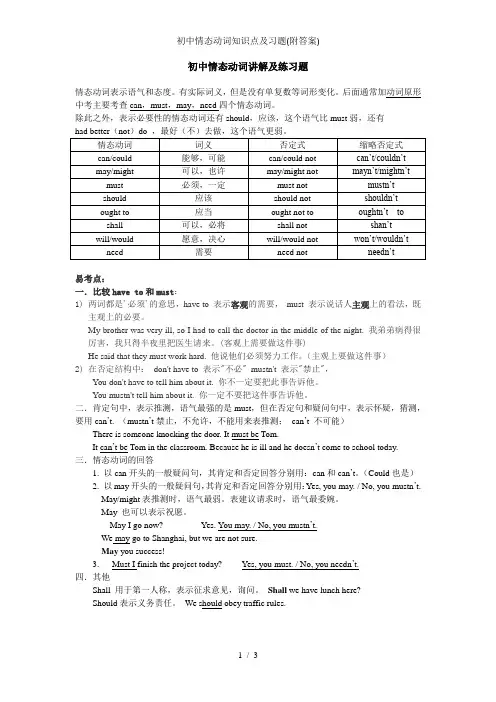
初中情态动词讲解及练习题情态动词表示语气和态度。
有实际词义,但是没有单复数等词形变化。
后面通常加动词原形中考主要考查can,must,may,need四个情态动词。
除此之外,表示必要性的情态动词还有should,应该,这个语气比must弱,还有易考点:一.比较have to和must:1) 两词都是'必须'的意思,have to表示客观的需要,must 表示说话人主观上的看法,既主观上的必要。
My brother was very ill, so I had to call the doctor in the middle of the night.我弟弟病得很厉害,我只得半夜里把医生请来。
(客观上需要做这件事)He said that they must work hard.他说他们必须努力工作。
(主观上要做这件事)2) 在否定结构中:don't have to 表示"不必" mustn't表示"禁止",You don't have to tell him about it. 你不一定要把此事告诉他。
You mustn't tell him about it. 你一定不要把这件事告诉他。
二.肯定句中,表示推测,语气最强的是must,但在否定句和疑问句中,表示怀疑,猜测,要用can’t. (mustn’t禁止,不允许,不能用来表推测;can’t 不可能)There is someone knocking the door. It must be Tom.It can’t be Tom in the classroom. Because he is ill and he doesn’t come to school today.三.情态动词的回答1. 以can开头的一般疑问句,其肯定和否定回答分别用:can和can’t。
最新初中英语语法知识—情态动词的知识点训练附答案(1)
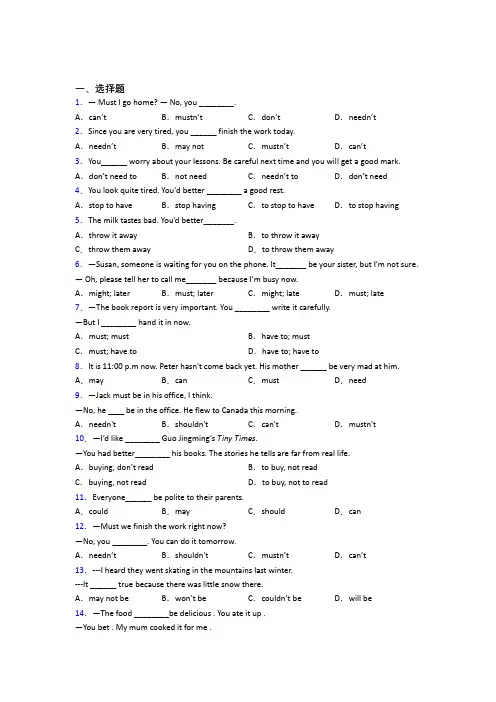
A.mustB.mayC.canD.need
20.—Could I call you by the first name?
—Yes, you.
A.must; mustB.will; will
C.need; needD.might; might
18.—Who is the lady over there? Is it Miss Wang?
—It __________be her. Miss Wang is much taller.
A.needn'tB.mustn'tC.shouldn'tD.can't
9.—Jack must be in his office, I think.
—No, hebe in the office. He flew to Canada this morning.
A.needn'tB.shouldn'tC.can'tD.mustn't
10.—I’d like ________ Guo Jingming’sTiny Times.
解析:C
【解析】
【分析】
11.Everyone______ be polite to their parents.
A.couldB.mayC.shouldD.can
12.—Must we finish the work right now?
—No, you ________. You can do it tomorrow.
初中英语语法知识—情态动词的技巧及练习题附答案
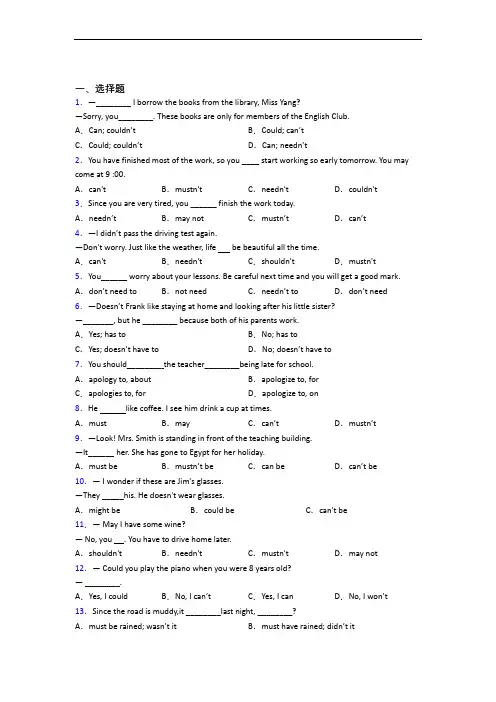
一、选择题1.—________ I borrow the books from the library, Miss Yang?—Sorry, you________. These books are only for members of the English Club.A.Can; couldn’t B.Could; can’tC.Could; couldn’t D.Can; needn’t2.You have finished most of the work, so you ____ start working so early tomorrow. You may come at 9 :00.A.can't B.mustn't C.needn't D.couldn't 3.Since you are very tired, you ______ finish the work today.A.needn’t B.may not C.mustn’t D.can’t4.―I didn’t pass the driving test again.―Don't worry. Just like the weather, life be beautiful all the time.A.can't B.needn't C.shouldn't D.mustn't 5.You______ worry about your lessons. Be careful next time and you will get a good mark. A.don’t need to B.not need C.needn’t to D.don’t need 6.—Doesn’t Frank like staying at home and looking after his little sister?—_______, but he ________ because both of his parents work.A.Yes; has to B.No; has toC.Yes; doesn’t have to D.No; doesn’t have to7.You should________ the teacher________being late for school.A.apology to, about B.apologize to, forC.apologies to, for D.apologize to, on8.He like coffee. I see him drink a cup at times.A.must B.may C.can’t D.mustn’t 9.—Look! Mrs. Smith is standing in front of the teaching building.—It______ her. She has gone to Egypt for her holiday.A.must be B.mustn’t be C.can be D.can’t be 10.— I wonder if these are Jim's glasses.—They _____his. He doesn't wear glasses.A.might be B.could be C.can't be11.— May I have some wine?— No, you . You have to drive home later.A.shouldn't B.needn't C.mustn't D.may not 12.— Could you play the piano when you were 8 years old?— ________.A.Yes, I could B.No, I can’t C.Yes, I can D.No, I won’t 13.Since the road is muddy,it ________last night, ________?A.must be rained; wasn’t it B.must have rained; didn’t itC.must rained; didn’t it D.must have rained; wasn’t it14.—Must I start now?—No, you_______________.A.mustn't B.can't C.needn't D.must 15.—Must I go out to have dinner with you, Mum?—No, you , my dear. Yo u’re free to make your own decision.A.shouldn’t B.mustn’t C.needn’t D.can’t16.— Must I go home? — No, you ________.A.can’t B.mustn’t C.don’t D.needn’t 17.(2017 • 湖北省宜昌市中考)—Life is becoming convenient with the Internet.—That’s true! Almost everything be done online.A.must B.would C.should D.can18.—Must I hand in my reports today?—No, you ________.A.mustn’t B.can’t C.shouldn’t D.don’t have to 19.一Already five people in the taxi, but the driver managed to take me as well.一Terrible, and it be an uncomfortable journey.A.can B.should C.must D.need20.My head teacher has made a set of rules to show what we students ________ and ________ not do in class.A.must; must B.will; willC.need; need D.might; might21.—Who is the lady over there? Is it Miss Wang?—It __________be her. Miss Wang is much taller.A.needn't B.mustn't C.shouldn't D.can't22.We _______ keep the new traffic law and learn how to protect ourselves.A.may B.should C.can D.need【参考答案】***试卷处理标记,请不要删除一、选择题1.B解析:B【解析】【分析】【详解】句意:——杨小姐,我能从图书馆借这些书吗?——对不起,你不能。
最新初中英语语法知识—情态动词的知识点训练及答案(2)
一、选择题1.—________ I borrow the books from the library, Miss Yang?—Sorry, you________. These books are only for members of the English Club.A.Can; couldn’t B.Could; can’tC.Could; couldn’t D.Can; needn’t2.—I’d like ________ Guo Jingming’s Tiny Times.—You had better________ his books. The stories he tells are far from real life. A.buying, don’t read B.to buy, not readC.buying, not read D.to buy, not to read3.―I can't stop smoking, Doctor.―For your health, I'm afraid you .A.must B.can C.need D.have to 4.―I didn’t pass the driving test again.―Don't worry. Just like the weather, life be beautiful all the time.A.can't B.needn't C.shouldn't D.mustn't5.I hope you __________ to my birthday party.A.to come B.can come C.comes D.are come 6.You look quite tired. You'd better ________ a good rest.A.stop to have B.stop having C.to stop to have D.to stop having 7.From March 23rd, 2013, anyone under the age of 14 ________ go into Disneyland alone. A.couldn’t B.mustn’t C.needn’t D.mightn’t 8.—Can I take some milk and biscuits to the reading room?—No, our school has a rule that students _______ eat or drink there.A.can’t B.mustn’t C.needn’t D.may not 9.You __ drive your car so fast. It's very dangerous.A.wouldn't B.shouldn't C.couldn't D.mightn't 10.—Have you heard about the temperature of the earth will rise to 59℃ in 2020?—Don’t worry! The news _______ be true.A.must not B.may not C.needn’t D.will not 11.-Could you help me with my English homework, Nancy?-Of course I____________. Glad to help.A.could B.can C.must D.do12.-Mum, must I stay there the whole day?-No, you__________. You__________ come back after lunch, if you like.A.mustn’t; can B.needn’t; must C.needn’t; may 13.—Must I go out to have dinner with you, Mum?—No, you , my dear. You’re free to make your own decision.A.shouldn’t B.mustn’t C.needn’t D.can’t14.(2017·甘肃白银·10)—I wonder if these are Danny's glasses.—They________be Danny's. He doesn't wear glasses.A.can't B.must C.mustn't D.can15.This book _____ Lucy’s. Look! Her name is on the book cover.A.must be B.may be C.can’t be D.mustn’t be 16.-_________ you help me with my homework?-Of course if I __________.A.Could; could B.Can't; can C.Could; can D.Can; could 17.When I write down what I am showing thanks to, it’s always for things that money______buy.A.needn’t B.shouldn’t C.may not D.can’t18.— Will Jim come to Yangzhou for a holiday?— He ________come, it depends on how much homework he will have.A.may B.should C.must D.need19.一Hurry up, Mark! Let's cross the road as quickly as possible.一No,you . Don't you see the light is still red?A.couldn't B.wouldn't C.mustn't D.needn't 20.—Could you help me download some Taylor Swift’s songs from Ku Gou?—Sorry, people download music from the Internet without payi ng, because it’s against the law. A.wouldn’t B.needn’tC.mustn’t D.couldn’t21.---You look very pretty, if I say so.---Thanks a lot for saying that.A.must B.may C.will D.have to 22.—______ you please tell me something about the life in Canada or America?—Sorry, I______. I don’t know either. I’m from Australia.A.Could; couldn’t B.Can; couldn’t C.Could; can’t D.Can; mustn’t 【参考答案】***试卷处理标记,请不要删除一、选择题1.B解析:B【解析】【分析】【详解】句意:——杨小姐,我能从图书馆借这些书吗?——对不起,你不能。
初中英语语法情态动词讲解与练习有答案
情态动词在句中放在谓语动词之前,谓语动词前若有助动词,则在助动词之前,疑问句中,情态动词放在主语之前。
I can see you. Come here. 我能看见你,过来吧。
He must have been away. 他一定走了。
What can I do for you? 你要什么How dare you treat us like that! 你怎么敢那样对待我们!三.情态动词的特点情态动词无人称和数的变化,情态动词后面跟的动词需用原形,否定式构成是在情态动词后面加“not”。
个别情态动词有现在式和过去式两种形式,过去式可以用来表达更加客气、委婉的语气,时态性不强,可用于过去,现在或将来。
我们称之为“功能用法”。
He could be here soon. 他很快就来。
May I come in? 我可以进来吗?May I use your dictionary? 我可以用你的词典吗?You may put on more clothes. 你可以多穿点衣服。
He said he might lend us some money. 他说他可以借给我们一些钱。
may 否定式为 may not, 缩写形式是mayn’t。
might 是may 的过去式,有两种用法,一种表示过去式,一种表示虚拟语气,使语气更加委婉、客气或对可能性的怀疑。
He told me he might be here on time. 他说他能按时间来。
Might I borrow some money now? 我可以借点钱吗?He might be alive. 他可能还活着。
3. must “必须;应该;一定;准是”,表示说话人认为有必要做某事,命令、You needn't have taken it seriously. 这件事情你不必太认真。
5. dare “敢”,多用在否定或疑问句中。
The little girl dare not speak in public. 小女孩不敢在公众面前说话。
初中英语情态动词详细用法归纳含练习及答案
初中英语情态动词具体用法归纳〔含练习及答案〕情态动词有具体的词义,但也同助动词一样,须要及其他词语一起构成句子的谓语,另外情态动词没有人称和数的改变,情态动词后必需跟动词原形。
1. 的用法:〔1〕.表示实力、答应、可能性。
表示实力时一般译为“能、会〞,即有种实力,尤其是生来具备的实力.如:, I ’t . 她能游得很快,但我不能。
I . 我用眼睛看。
是的过去式。
表示过去的实力。
. 经常指经过努力,花费了时间和劳力之后才能做到某事。
.〔2〕.表示答应,常在口语中。
如: . 你可以用我的字典。
〔3〕.表示推想,可能性,意为“可能〞,常用于否认句和疑问句中,此时’t 译为“ 不行能〞。
如: ? 这个消息会是真的吗?— ?那个人有可能是我们老师吗?—, ’t . a .不行能。
咱们老师正在巡游长城呢。
【例题】—I . . —. , I . ’t ’t ’t ’t【解析】依据下文“我刚去过那儿〞可知,应为“ 不行能〞,’t 表示推想[答案] A的用法:〔1〕的过去式,意为“ 能、会〞,表示过去的实力。
如: 10. 他十岁时就会写诗。
〔2〕. 在疑问句中,表示委婉的语气,此时没有过去式的意思。
如a ? 你能帮我个忙吗?— I ? 我能用一下你的钢笔吗? —, .可以。
〔用问,不能用答。
〕2. 的用法:〔1〕.表示恳求、答应,比正式,如: I ? 我可以借你的自行车吗? . 如今你可以回家了。
【例题】— I 3? — . . A. D.【解析】在此处表示恳求,意为“ 做……可以吗〞。
答案:A(2) .表示推想,议论可能性,意为“ 可能,或许〞,一般用于确定句中。
如: . 明天可能会下雨。
. 她可能在家呢. 翻译为“可能不〞(3) 的过去式为,表示推想时。
可能性低于。
如: . .他分开学校了,可能是他生病了。
(4) . 表示盼望、祈求、祝福,常可译为“祝福〞。
通常是用 +主例如: a . 祝你过得开心。
! 祝你华蜜!!祝你胜利!3. 的用法:(1) 表示主观看法,意为“必需、确定〞。
初中英语情态动词训练附答案
初中英语情态动词训练附答案一、情态动词单项选择题1.I cannot go near the lions and tigers. They _________ hurt me.A.may B.may not C.must D.mustn’t【答案】A【解析】【详解】句意:我不能靠近狮子和老虎。
它们可能伤害我。
考查情态动词辨析。
may可能,表推测;may not不可以;must必须,强调主观意愿;mustn’t不能,表禁止。
根据上文“I cannot go near the lions and tigers”和语境,可知此处表示一种可能性,狮子和老虎可能伤害我;后面三项不合语境,故选A。
2.Life is like riding a bike. To keep our balance, we ________ keep moving.A.needn’t B.can C.must【答案】C【解析】【详解】句意:人生就像骑单车。
为了保持平衡,我们必须不断前进。
考查情态动词。
needn’t不必;can可以;must必须。
根据“Life is like riding a bike.”结合常识可知骑单车时为保持平衡必须不断前进,用must符合语境。
故选C。
3.— May I work as a volunteer in Xiamen International Tea Fair tomorrow, Mum?— You ________, if you pass the exam of tea knowledge.A.must B.should C.can【答案】C【解析】【详解】句意:——妈妈,明天我可以去厦门国际茶展做志愿者吗?——你可以,如果你通过茶叶知识考试的话。
考查情态动词辨析。
must必须;should应该;can可以。
根据“if you pass the exam of tea knowledge”可知,如果通过考试就可以去参加志愿者,故选C。
- 1、下载文档前请自行甄别文档内容的完整性,平台不提供额外的编辑、内容补充、找答案等附加服务。
- 2、"仅部分预览"的文档,不可在线预览部分如存在完整性等问题,可反馈申请退款(可完整预览的文档不适用该条件!)。
- 3、如文档侵犯您的权益,请联系客服反馈,我们会尽快为您处理(人工客服工作时间:9:00-18:30)。
一、选择题1.You should________ the teacher________being late for school.A.apology to, about B.apologize to, forC.apologies to, for D.apologize to, on2.You run with the train when it is coming. It’s dangerous.A.may not B.mustn’t C.needn’t3.-Listen! A wolf is crying!-It _______ be a wolf, because a wolf never comes out at this time.A.mustn’t B.needn’t C.can’t D.don’t 4.(2018·山东临沂) Could you please speak a little louder? I ______ hear you very well. A.can’t B.mustn’tC.shouldn’t D.needn’t5.―I c an't stop smoking, Doctor.―For your health, I'm afraid you .A.must B.can C.need D.have to 6.I’ve bought a nice necklace for Jo’s birthday. She _____like it, but I’m not sure. A.can B.may be C.might D.must 7.—Is that cap Bob’s?—No, it ________ be his. His is blue.A.can’t B.mustn’t C.needn’t D.may not 8.—Can we walk across the road now?—No, we . We have to wait until the light turns green.A.couldn’t B.needn’t C.shouldn’t D.mustn’t 9.—Can I take some milk and biscuits to the reading room?—No, our school has a rule that students _______ eat or drink there.A.can’t B.mustn’t C.needn’t D.may not 10.—Have you heard about the temperature of the earth will rise to 59℃ in 2020?—Don’t worry! The news _______ be true.A.must not B.may not C.needn’t D.will not 11.—______ you please tell me something about the life in Canada or America?—Sorry, I______. I don’t know either. I’m from Australia.A.Could; couldn’t B.Can; couldn’t C.Could; can’t D.Can; mustn’t 12.---You look very pretty, if I say so.---Thanks a lot for saying that.A.must B.may C.will D.have to 13.—The book report is very important. You ________ write it carefully.—But I ________ hand it in now.A.must; must B.have to; mustC.must; have to D.have to; have to14.One ______ easily lose his way when he visits or comes to a new place.A.may B.must C.need D.should 15.—Jack must be in his office, I think.—No, he be in the office. He flew to Canada this morning.A.needn't B.shouldn't C.can't D.mustn't 16.—The food ________be delicious . You ate it up .—You bet . My mum cooked it for me .A.must B.may C.can D.need17.— Will Jim come to Yangzhou for a holiday?— He ________come, it depends on how much homework he will have.A.may B.should C.must D.need18.–Is Mike coming to the fashion show tomorrow?--I’m not sure. He ______ not come.A.must B.can C.may D.should19.Will you please________them________the Birdwatching Society?A.inviting; join B.to invite; to join C.invite; to join D.to invite; join 20.—Could you help me downloa d some Taylor Swift’s songs from Ku Gou?—Sorry, people download music from the Internet without paying, because it’s against the law. A.wouldn’t B.needn’tC.mustn’t D.couldn’t21.—We've prepared all kinds of foods for the picnic.—Do you mean I___ bring anything?A.can't B.needn't C.mustn't D.won't22.(江苏省无锡市锡北片2017届九年级下学期期中考试)—Where are you going for your summer holiday?—We go to Yun Nan, but we haven’t decided yet.A.should B.will C.may D.must【参考答案】***试卷处理标记,请不要删除一、选择题1.B解析:B【解析】【详解】句意:你应该因为上学迟到向老师道歉。
本题考查动词短语。
apology道歉,是名词;apologize道歉,是动词;about关于,for为了,on在……上面。
apologize to sb for sth“因为某事向某人道歉”,位于情态动词should 后,用动词原形,故选B。
2.B解析:B【解析】【详解】句意:火车来的时候你不能跟它一起跑,这很危险。
考查情态动词。
may not可能不;mustn’t不能,表禁止;needn’t不需要。
根据“It’s dangerous”及语境可知,此处是表达“你不能跟着火车跑”,在这儿应是不允许,强烈的禁止的意思,故用mustn’t。
故选B。
3.C解析:C【解析】【详解】句意:--听! 狼在叫! --它不可能是狼,因为狼从来不会在这个时候出来。
A. mustn’t禁止;B. needn’t没有必要;C. can’t不可能;D. don’t构成一般现在时的否定句。
根据“because a wolf never comes out at this time因为狼从来不会在这个时候出来”,可推断它不可能是狼,故选C。
【点睛】情态动词表推测的用法:can表示“可能”;can’t表示“不可能”;may表示“可能”,must表示“一定”,注意mustn’t表示“禁止”不表示推测,表示否定推测要用can’t.4.A解析:A【解析】【详解】句意:请你说大点声好吗?我不能很好地听到你说的话。
考查情态动词辨析。
can't不能,表示不能够;mustn't不许,表禁止;shouldn’t不应该,表劝诫;needn’t无需,表示没必要。
本句表示“不能够”,根据句意语境,可知BCD三项意思都与句意不合,故选A。
5.D解析:D【解析】【详解】句意:——我不能戒烟,医生。
——为了你的健康,恐怕你得这么做。
考查情态动词辨析。
must必须,强调主观意愿;can能,表能力或许可;need需要,指有必要;have to必须,强调客观需要。
根据“For your health为了你的健康”,可知无论愿不愿意戒烟是健康所需,故选D。
6.C解析:C【解析】【详解】句意:乔的生日我给她买了一条漂亮的项链。
她可能会喜欢,但是我不确定。
考查情态动词表示推测。
can表示能、可以;may表示可能,might是其过去式;must表示一定、必须。
根据题干中but I'm not sure.可知可能性较小的推测,则可用may或者might,B项中may后有系动词be,原句中有动词like,则只能用might。
故选C。
7.A解析:A【解析】【详解】句意:——那顶帽子是Bob的吗?——不,那不可能是他的。
他的是蓝色的。
考查情态动词表推测。
can’t 不可能,否定推测;mustn’t 禁止,不表推测;needn’t 不需要;may not 可能不是,表不确定的推测。
根据回答“No”和“His is blue.”可知这里说话者表达完全否定推测,故选A。
【点睛】在情态动词表推测时,很多同学会搞混can’t和mustn’t,认为他们都表示完全否定的推测,在做题时容易误选。
can’t 不可能,表示完全否定的推测,但是mustn’t 禁止,并不用于表推测。
8.D解析:D【解析】【分析】【详解】句意:-我们现在能过马路了吗?-不,我们不能,我们要等到交通灯变绿。
